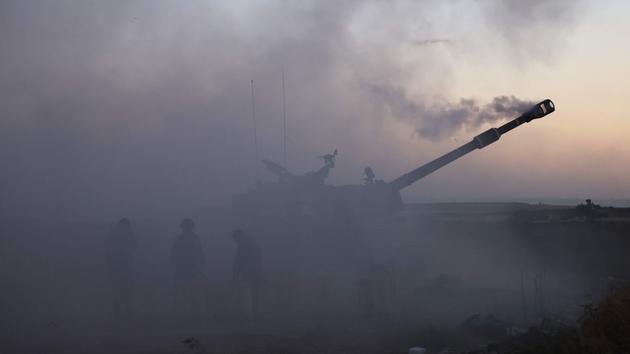They are coming from all sides, but none has yet succeeded.
The latest diplomatic initiative was brandished by France, which tabled a draft ceasefire resolution on Tuesday at the UN Security Council, in coordination with Egypt and Jordan.
No one yet knows what fate this diplomatic movement will have, to which the United States has so far refused its support.
Read also: Joe Biden steps up diplomatic pressure on the Israelis
Since the start of the crisis, Joe Biden has remained cautious and discreet, he who had not made the Palestinian question a priority. Determined to return to the Iran nuclear deal, he does not want another subject of dissension with Israel, his great ally in the region. For eight days, the US administration has blocked any decision by the United Nations that could be contrary to its interests and those of Israel, which needs to have sufficiently reduced the threatening capabilities of Hamas before accepting a break. But as bilateral demarches multiply, and ad hoc groups form behind the scenes to support bogged down diplomacy at the United Nations, Joe Biden has finally called on Israel for a rapid "
de-escalation.
"
" Wednesday.
This news may herald a truce, so true is it that there can be no diplomatic solution in the Middle East without the commitment of the United States.
The "political opportunism" of Moscow and Beijing
In this diplomatic rush, the European Union is absent subscribers, both divided among its members and out of step with reality. No one knows the name of his special correspondent for the Middle East, the Dutch diplomat Susanna Terstal, who has held this post for two and a half years. As for the meeting of European foreign ministers on Tuesday, it came up against the secession of Hungary, which refused to support its call for a ceasefire. Budapest rejects
"any biased statement towards Israel"
and prefers
"pragmatism"
to
"moral lessons".
To be the most visible, the Hungarian divide on the Middle East is not the only one among the 27.
“More generally, the European Union has marginalized itself on this issue because it does not want to talk to Hamas.
She prefers to close her eyes and pretend there is no movement.
It thus deprives itself of the possibility of playing a mediator role.
But we have to talk to terrorists if we want to relaunch the peace process.
We are doing it today in Afghanistan with the Taliban.
Conflicts end when you talk to opponents, ”
said Hugh Lovatt, Middle East specialist at the European Council for International Relations (ECFR).
Read also: Israel: international pressure increases as the death toll grows
The European Union has also deprived itself of influence because it has not used the levers at its disposal to put pressure on Israel and its colonization policy, nor to punish attacks on democracy, especially since the cancellation of the elections, within the Palestinian Authority, of which it is nevertheless a big donor.
“The Palestinian leadership is increasingly illegitimate and autocratic, all with European funding. But the EU does not want to address this issue, ”
says Hugh Lovatt. More generally, the European Union has concentrated its efforts on humanitarian aid and the economy when the problems are above all political.
“The EU has always put the survival of the Oslo process first. She declined to act so as not to jeopardize the peace process. But what peace process are we talking about? It no longer exists, ”
continues the ECFR specialist.
The diplomatic vacuum has attracted other powers, such as Russia and China, which are trying to make their voices heard and to offer themselves in turn as mediators. But this is, according to Hugh Lovatt, only a
"political opportunism". “Neither country is able to get involved. Israel will never accept any interlocutor other than the United States. ”
The involvement of Arab countries is much more serious. It is because it speaks to everyone - to Israel, to the Palestinian Authority and, indirectly, to Hamas - that Egypt, a regional and border power of Gaza, is most engaged in mediation efforts. , although so far they haven't given anything.
"Without international pressure on the belligerents, without the impetus of the United States and Europe, Egyptian intervention cannot be sufficient to obtain a cessation of hostilities",
explains a diplomat.
Read also: In Gaza, the hunt for Israel to eliminate the military leader of Hamas
No doubt the centrifugal efforts will converge when the Israeli forces have weakened Hamas's offensive capabilities enough to resolve to a pause.
Israel is now considering the
"opportune moment"
for a ceasefire.
The apparent slowness of American diplomacy was probably intended, according to a diplomatic source, to give this time to its ally.
While waiting for calm to return, lessons and questions are already emerging. First the first lesson.
“We cannot completely evacuate the Israeli-Palestinian conflict. We had the feeling that it was manageable over time, at low noise, with low intensity. But if we deny its reality, it represents itself to us. And if we don't treat him politically, he will be remembered in the worst way ”,
comments the same diplomatic source. Then, the first question. Is the Israeli doctrine of hitting Hamas as soon as it becomes too dangerous militarily and its provocations intolerable still sufficient to contain Palestinian pressure over time? Or does the conflict risk breaking out of its box into Israeli towns and falling into the hands of a new generation of Palestinians less linked to political organizations?

